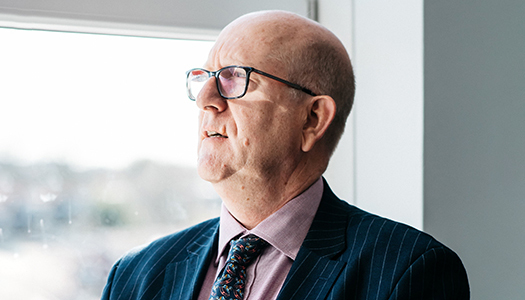Interview with Richard Buxton: Pioneering Mediator Shares Insights
Please share a brief overview of your journey in the field of civil and commercial mediation.
I witnessed the horrendous stress, costs, and complexities of litigation early in my career. I experienced this even more personally in the early 1990’s as a father not being able to see his firstborn son and having to go through High Court litigation and the probation service (pre CAFCASS). I resolved professionally to explore other options. Firstly, I turned to arbitration and took an evening course in the City of London. I became an Associate member of the Institute of Arbitrators. Unfortunately, I did not pass the final award exam either in London or Singapore, so I was unable to become an Arbitrator! My interest in ADR never left me. Therefore, when I started a family law practice, I turned to family mediation as I perceived this was a far better way to sort out child arrangements and the splitting of assets on divorce than the Family Courts. 5 years later in 2019, I qualified as a Civil and Commercial mediator including Workplace and Employment in 2020.
What is the role of the mediator and how is the mediator appointed?
Fundamentally, a mediator must be a neutral and independent professional. Mediators wear many hats as follows:
- The mediator is a “friend” to all; he/she must build a relationship of trust with the participants quickly and effectively.
- A negotiator – mustuse the information provided in the best and most positive way in helping parties to shape and settle the best deal possible as realistically, and that will stick.
- A communicator-bringing clarity to an often confused and deadlock situation and helping participants to speak with each other in a safe environment.
- A manager– orchestrate the day in the most efficient way helping participants to make the best of the opportunity.
There are three main ways of being appointed:
- directly.
- through a provider; or
- by a court or other scheme, e.g. Civil Mediation Council(“CMC”)
How has mediation positively impacted the resolution of both civil and commercial disputes?
Firstly, mediation is quicker, cheaper, and less stressful and time-consuming litigation. Secondly, mediation is more flexible than litigation in terms of potential outcomes. Thirdly, mediation is less likely to be harmful to the long-term relationship between the parties. Fourthly, mediation is conducted privately under less pressure and less artificial circumstances than a court hearing. Fifthly, it is far more likely that both parties will emerge as winners or at least neither party will emerge as a disgruntled “loser.” Mediation is particularly attractive to resolve civil and commercial disputes when litigation is becoming ever more expensive and time-consuming, when the law is getting increasingly complex, when legal aid is ever more attenuated, and when court fees are being increased markedly. Mediation is a great method for ordinary people to have access to justice, given these factors. The great majority of mediations are successful. CMC confirms “that 75 – 80% of cases settle on the day of mediation itself and another 10 to 15% settle shortly after.”
What are the disadvantages of mediation?
- a) If a mediation does not work, it has corresponding disadvantages: the overall proceedings, because they involve a failed mediation as well as a trial, cost more, take more time, and are more likely to cause serious damage to the relationship between the parties.
- b) A litigant who is wealthy or wants to delay can use mediation cynically to put pressure on an opponent who is poor or in a hurry.
- c) The parties at what seemed at the time to be a successful mediation can retrospectively feel that they are into what now is an unsatisfactory settlement when they should have had their day in court.
- d) If all cases are settled and hardly any disputes go to court, the development of the law will be prejudiced. This is significant in our common law world where our judges do not simply interpret the law but formulate and develop it over the centuries.
- e) It is difficult to know whether the outcome was fair.
For which cases is mediation appropriate and how does mediation fit into litigation and arbitration?
The bulk of personal injury cases are settled without the need for formal mediation.
Some disputes involving extremes of conflict or imbalances of power may be unsuitable for mediation also where one has a situation where a participant can’t separate the person from the problem.
Otherwise, generally, I cannot think of a dispute that is unsuitable to be mediated. Mediation per se does not fit into either litigation or arbitration because it is a form of ADR. Mediation is far better than litigation or arbitration because it means that you have control over the outcome rather than a stranger imposing a decision that means one party wins and the other party loses. Life is not like that, not black or white but all shades in between. People see the same facts and events through different eyes for a whole range of different reasons; to put someone who does not know the parties or the circumstances into a position of deciding the winner cannot be fair. Mediation allows the parties to be in control of the outcome, to find a solution that is anywhere on the spectrum. That solution can consider a whole number of matters that the judge or arbitrator cannot-e.g. personal and commercial circumstances relationships, future business, ability to pay, settlements in kind and so on. The participants decide, and that must be more just than a stranger imposing a judgement in favour of one or the other.

What is the procedure in mediation?
Firstly, upon the mediator’s being appointed, the mediator will send a standard Agreement to Mediate. This addresses the confidentiality of the matter and should be signed by all participants. The mediator should then request a summary of the dispute from each participant; the mediator does not need all the files or papers to help participants get to a deal. It is usually helpful to have an agreed bundle. Occasionally, there is a pre-mediation meeting. At the first open session, information should be exchanged.
The mediator may use CAVNNN.
Meaning
- C
- Authority to settle from participants/remote.
- Voluntary attendance.
- N
- No impose settlement-participants decide. The mediator doesnot advise.
- Non-binding.
The mediator will then deal with matters such as time (idle /constraints), refreshments, time table etc to the end of the day. Then follow opening statements/telling the stories with the mediator, stimulating dialogue and using the flipchart.
There then follows the exploring stage/negotiating stage and concluding stage.
Sessions can be open with all participants or closed i.e. only one participant.
What type of civil and commercial mediation cases have you been involved with?
- Housing disrepair issues between a London Borough and tenants.
- Inheritance issues between four siblings following the death of their wealthy mother.
- TOLATA case between mother and son.
- Clinical negligence disputes.
- Employment /Workplace disputes.
- Rent arrears/termination of tenancy disputes.
- Personal injury claims.
- Property disputes- both domestic and landlord and tenant.
Often, I find in London the participants are from different countries and rarely from the United Kingdom. Having lived and worked both in Singapore and France and advised many foreign clients, I can appreciate that different nationals have a different approach to negotiation and often a different cultural attitude to the mediation process.
Also, having been an employer and an employee for decades, this does give me useful knowledge of the workplace. My background as a property and litigation solicitor for 30 years is also very helpful when it comes to helping conclude negotiations in mediations.
What is remote mediation and is the process and results the same as traditional mediation?
Remote mediation is a process of mediating online through computer software or by telephone. Remote mediation could take place on many different platforms. It gives the mediator, and the participants maximum flexibility and is also proven to reduce stress and anxiety in attending mediation in this way. One of the main benefits of remote mediation is a reduction in travel and all participants having to meet in one geographical location. One of the biggest challenges is embracing the technology used to access remote mediation. The Society of Mediators have published a helpful Guide to Remote mediation using Zoom and similar software in February this year.
Since the beginning of Covid I have been using Zoom which is excellent and has a very helpful page on getting started. You can learn how to use the Zoom desktop or mobile client; there are many helpful learning tutorials on Zoom to help you get the most out of using Zoom. You do not need a Zoom account to use Zoom as a participant.
I find that my fellow members of the Society of Mediators use Zoom, and we started a mutual self-help group in Covid to help us get to grips with this technology.
It really is user-friendly and if I can use it, I am sure all the readers of this article can do the same! Mediators can create virtual private rooms, including breakout rooms. A great deal of our training as mediators with the Society is done in this way.
Of course, the process is impersonal, but one can successfully conclude a mediation in a similar way as the traditional in person method.
Personally, I much prefer to use all my senses in person with participants. However, where a participant is many miles away or incapacitated or abroad, then a Zoom mediation has much to commend it. There are, of course, other remote methods, such as Microsoft Teams if one prefers. Using WhatsApp encrypted is also a great free method of communicating on the phone.
What are some of the common challenges faced in mediation, and how to address them?
Bias
This could be a problem because an individual may or may not be aware of their biases. Neutrality is the core concept of mediation- it is a challenge for most mediators. Personally, to be aware of bias I seek feedback from the participants and as many people as I have regular contact with including family. I do my best to accept the feedback.
Mindfulness
A mediator needs to concentrate not only on the words being used by the participants but also the meaning which is mentally taxing and requires concentration. This is why it is beneficial to work in short sessions often of not more than an hour. The brain consumes oxygen and glucose to maintain high levels of attention and concentration. I encourage breaks to help focus, be alert, pay attention, remain neutral and suspend judgement. Increasing mindfulness requires reflection and training.
How do you see the role of mediation involving in the coming years?
I expect commercial mediation to play a more significant role in conflict resolution because of:
Efficiency – Mediation allows participants to resolve their disputes quickly and with minimal costs compared to litigation. As the number of disputes continues to rise, mediation will be a critical tool in resolving conflicts.
Confidentiality
Flexibility – Mediation can be customised to fit the needs of the participants wherever they are in the world and in whatever business they may be and from whatever cultures or backgrounds they may have.
Sustainability of relationships – Mediation can preserve relationships and promote long-term collaboration. The process allows participants to work together towards a mutually beneficial outcome.
Technology
- This will help streamline the mediation process to be more efficient and cost-effective.
- Covid has accelerated this massively.
- Cost-mediation is both quick and inexpensive compared with litigation.
As businesses become more complex and global, the need for mediation will continue to grow.
ABOUT RICHARD
I qualified as a solicitor in 1977 in Holborn and worked as a property specialist until 1987, and was a salaried partner at Field Fisher from 1988 to 1991. I then re-qualified in Singapore and was called to the Bar there in 1994. I worked as a commercial litigator and Advocate in the High Court, including personal injury work, until 1997. I then returned to working as a property lawyer until 2008. I retrained in family law and started my firm, Mortlake Law, in 2012 and retrained further in family mediation in 2014. I became an Accredited Civil and Commercial mediator in 2019, having incorporated Mortlake Law Ltd, trading as Mortlake Law & Mediation earlier that year. My company is now based at 20 Mortlake London SW14 8JN. Alongside my mediation work, I offer One Couple One lawyer service. I specialise in financial remedies for divorce and Tolata cases involving cohabitants and unmarried couples.
I have found my background in property law and litigation invaluable in helping me mediate disputes. After 50 years working in law, both London and Singapore have witnessed first-hand the enormous changes, not least the virtual revolution to the digital world. The words” paperless office” was bandied about decades ago, but we have now entered that era!
I have trained with UK Mediation, Family Mediators Association and the Society of Mediators. Despite Covid I was able to keep my company going throughout. I have been able to use Zoom for remote mediation which has been accelerated by Covid. All in all, it has been a fascinating journey. I feel privileged to have met some wonderful people in my career. I love to help and advise my clients going through difficult emotional times, whether it is a breakup, divorce, or litigation.
I am a member of Resolution and wholeheartedly recommend the wonderful work this organisation does in the world of family law. I am proud to say that I am the exclusively recommended mediation expert in the UK by Advisory Excellence from this year.
I’m proud to say that I have been recognised for my mediation work by the Legal 500 and will be in their digital edition from April 2024
Richard Buxton LLB(Hons)
CMC Accredited Civil and Commercial Mediator
Trained Family Mediator
Member of the Society of Mediators, The Family Mediators Association and Resolution
Advocate & Solicitor (Singapore) – non-practising.
Richard Buxton LLB (Hons)MSoM
Founder & Managing Director
Mortlake Law Ltd t/a Mortlake Law & Mediation
richard@mortlakelaw.co.uk
t: 0203 935 9490
w: www.mortlakelaw.co.uk
www.linkedin.com/in/richardbuxton


Published by: www.lawyer-monthly.com




